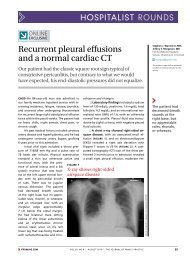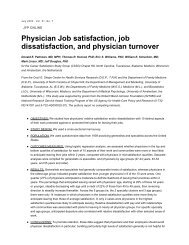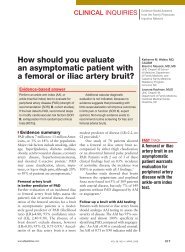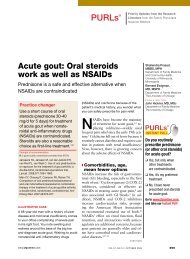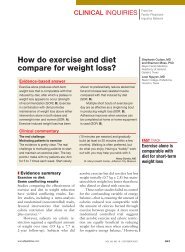Clinical Inquiries - The Journal of Family Practice
Clinical Inquiries - The Journal of Family Practice
Clinical Inquiries - The Journal of Family Practice
You also want an ePaper? Increase the reach of your titles
YUMPU automatically turns print PDFs into web optimized ePapers that Google loves.
andomised trial. Lancet 1999; 353:9–13.<br />
3. Packer M, Bristow MR, Cohn JN, et al. <strong>The</strong> effect <strong>of</strong><br />
carvedilol on morbidity and mortality in patients with<br />
chronic heart failure. U.S. Carvedilol Heart Failure Study<br />
Group. N Engl J Med 1996; 334:1349–1355.<br />
4. Lee S, Spencer A. Beta-blockers to reduce mortality in<br />
patients with systolic dysfunction: a meta-analysis. J Fam<br />
Pract 2001; 50:499–504.<br />
5. Doval HC, Nul DR, Grancelli HO, Perrone SV, Bortman<br />
GR, Curiel R. Randomised trial <strong>of</strong> low-dose amiodarone in<br />
severe congestive heart failure. Grupo de Estudio de la<br />
Sobrevida en la Insuficiencia Cardiaca en Argentina<br />
(GESICA). Lancet 1994; 344:493–498.<br />
6. Singh SN, Fletcher RD, Fisher SG, et al. Amiodarone in<br />
patients with congestive heart failure and asymptomatic ventricular<br />
arrhythmia. Survival Trial <strong>of</strong> Antiarrhythmic <strong>The</strong>rapy<br />
in Congestive Heart Failure. N Engl J Med 1995; 333:77–82.<br />
7. Effect <strong>of</strong> prophylactic amiodarone on mortality after acute<br />
myocardial infarction and in congestive heart failure:<br />
meta-analysis <strong>of</strong> individual data from 6500 patients in randomised<br />
trials. Amiodarone Trials Meta-Analysis<br />
Investigators. Lancet 1997; 350:1417–1424.<br />
8. Piepoli M, Villani GO, Ponikowski P, Wright A, Flather<br />
MD, Coats AJ. Overview and meta-analysis <strong>of</strong> randomised<br />
trials <strong>of</strong> amiodarone in chronic heart failure. Int J Cardiol<br />
1998; 66:1–10.<br />
9. Echt DS, Liebson PR, Mitchell LB, et al. Mortality and<br />
morbidity in patients receiving encainide, flecainide,<br />
or placebo. <strong>The</strong> Cardiac Arrhythmia Suppression Trial.<br />
N Engl J Med 1991; 324:781–788.<br />
10. Connolly SJ. Meta-analysis <strong>of</strong> anti-arrhythmic drug trials.<br />
Am J Cardiol 1999; 84:90R–93R.<br />
11. Hunt SA, Baker DW, Chin MH, et al. ACC/AHA guidelines<br />
for the evaluation and management <strong>of</strong> chronic heart failure<br />
in the adult. Bethesda, Md: American College <strong>of</strong><br />
Cardiology; 2001.<br />
12. Priori SG, Aliot E, Blomstrom-Lundqvist C, et al. Task<br />
Force on Sudden Cardiac Death <strong>of</strong> the European Society <strong>of</strong><br />
Cardiology. Eur Heart J 2001; 22:1374–1450.<br />
13. HFSA guidelines for management <strong>of</strong> patients with heart<br />
failure caused by left ventricular systolic dysfunction—<br />
pharmacological approaches. Heart Failure Society <strong>of</strong><br />
America. Pharmacotherapy 2000; 20:495–522.<br />
Do nasal decongestants<br />
relieve symptoms?<br />
■ EVIDENCE-BASED ANSWER<br />
Oral and topical nasal decongestants result in a<br />
statistically significant improvement in subjective<br />
symptoms <strong>of</strong> nasal congestion and objective<br />
nasal airway resistance in adults’ common colds<br />
(strength <strong>of</strong> recommendation [SOR]: A, based<br />
on randomized controlled trials). Evidence is<br />
lacking to support the use <strong>of</strong> decongestants in<br />
acute sinusitis.<br />
CLINICAL INQUIRIES<br />
■ EVIDENCE SUMMARY<br />
Nasal congestion is the most common symptom<br />
<strong>of</strong> the common cold, and hundreds <strong>of</strong> millions <strong>of</strong><br />
dollars are spent annually on decongestants. A<br />
Cochrane review <strong>of</strong> 4 randomized controlled trials<br />
compared single doses <strong>of</strong> oxymetazoline,<br />
pseudoephedrine, and phenylpropanolamine. 1<br />
Included studies involved from 30 to 106 participants,<br />
were double-blinded and placebo-controlled,<br />
used either topical or oral decongestants<br />
for symptoms <strong>of</strong> less than 5 days’ duration, and<br />
measured either subjective or objective relief or<br />
adverse events. All 4 studies used nasal airway<br />
resistance as an objective measure <strong>of</strong> nasal congestion,<br />
and a combined symptom score as a<br />
subjective measure <strong>of</strong> relief. One study also<br />
administered a side-effect questionnaire.<br />
In all studies, topical and oral decongestants<br />
were equally efficacious, producing a<br />
13% reduction in subjective symptoms and a<br />
significant decrease in nasal airway resistance<br />
after 1 dose <strong>of</strong> decongestant. Only 1 study<br />
investigated repeated doses <strong>of</strong> decongestants<br />
and found no significant additional improvement<br />
from repeated doses over a 5-day period.<br />
More studies are needed to evaluate efficacy<br />
<strong>of</strong> multiple doses. <strong>Clinical</strong> interpretation <strong>of</strong> these<br />
results must take into consideration that quality<strong>of</strong>-life<br />
measures were not evaluated and that<br />
none <strong>of</strong> the studies included children under 12.<br />
Limited data are available on decongestants<br />
in sinusitis. Most studies focused on the use <strong>of</strong><br />
nasal corticosteroids. One placebo-controlled,<br />
randomized controlled trial evaluated the effect<br />
on mucociliary clearance from adding nasal<br />
saline, nasal steroids, or oxymetazoline to<br />
antibiotics in acute bacterial sinusitis. 2 <strong>The</strong><br />
group using oxymetazoline increased mucociliary<br />
clearance immediately (within 20 minutes).<br />
However, at 3 weeks, the improvement in<br />
mucociliary clearance in the oxymetazoline<br />
group was not significantly different than in the<br />
other groups.<br />
An additional prospective, placebo-controlled<br />
study evaluated improvement in x-ray<br />
CONTINUED<br />
SEPTEMBER 2003 / VOL 52, NO 8 · <strong>The</strong> <strong>Journal</strong> <strong>of</strong> <strong>Family</strong> <strong>Practice</strong> 721



